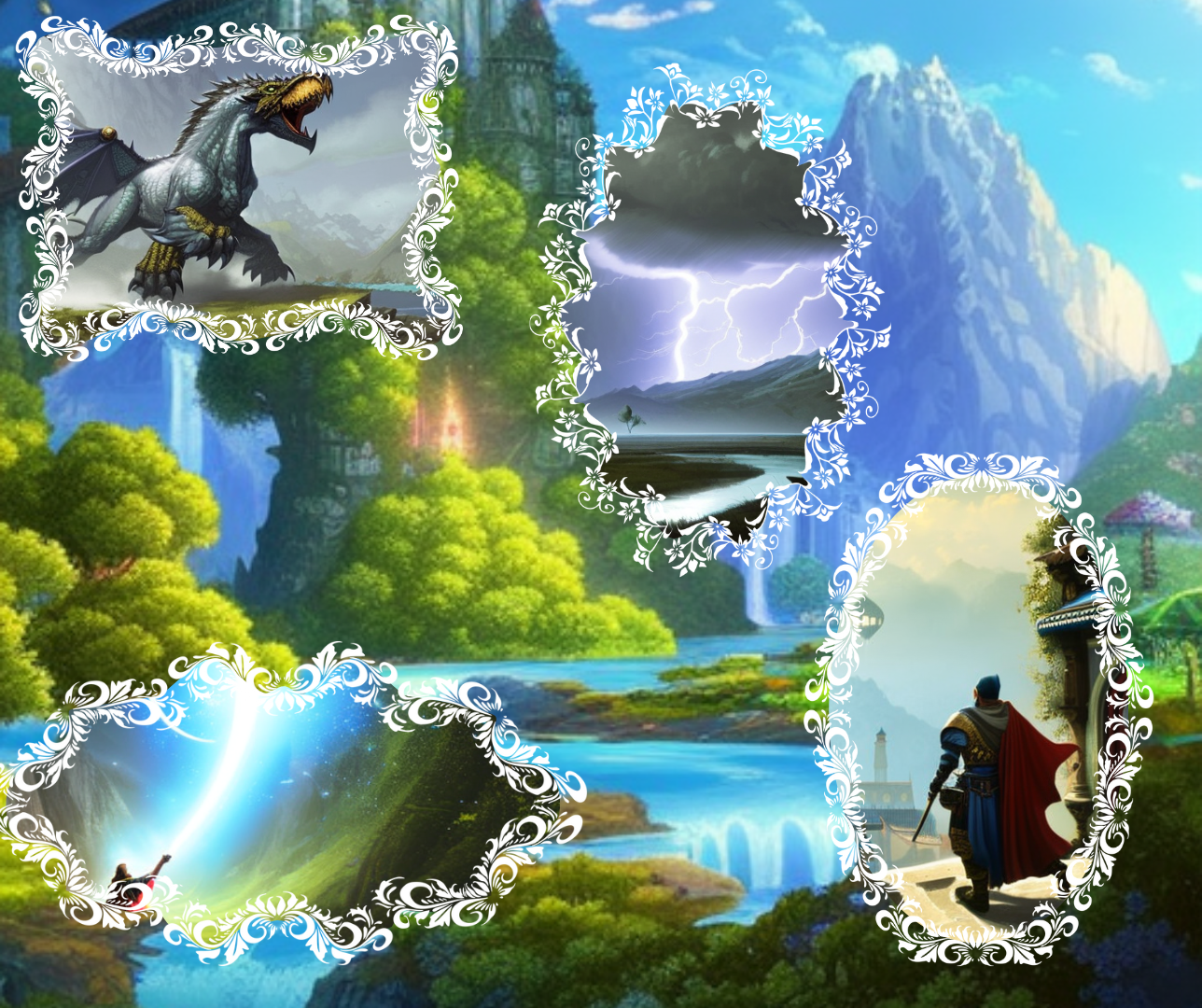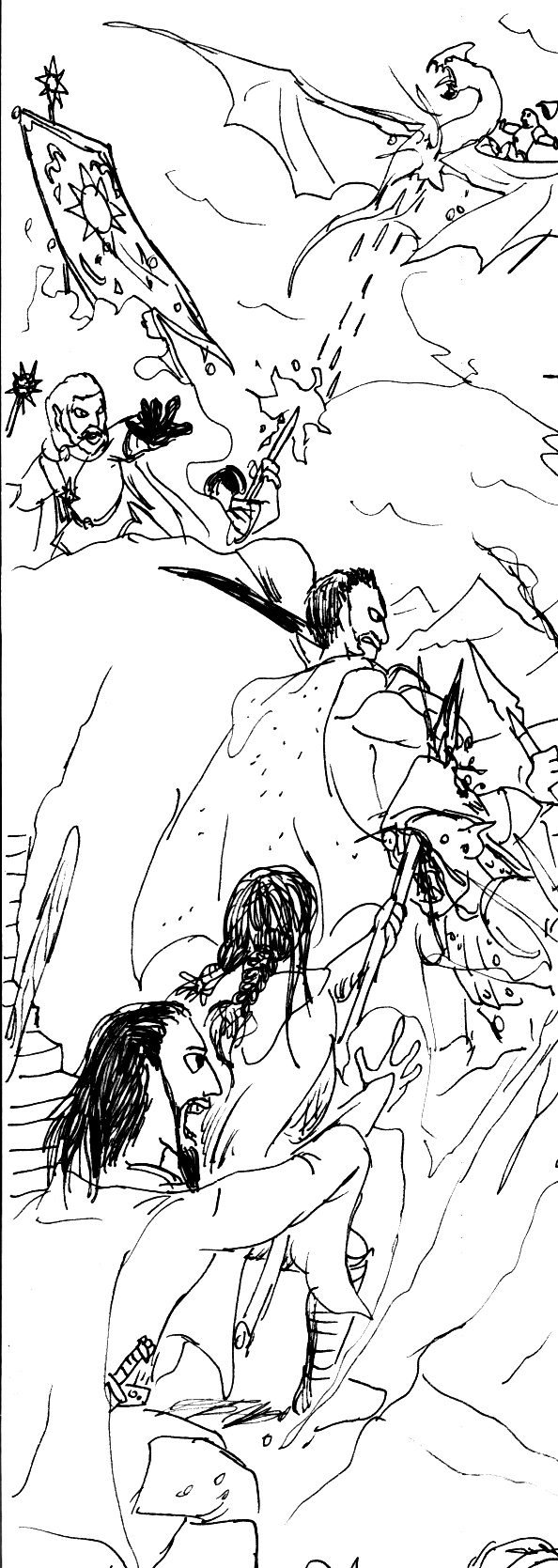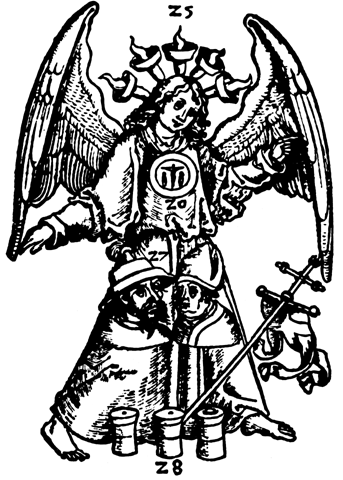#character
Chaos of the Multiverse

Introduction
I had a strange dream about traveling between worlds using magical portals, and decided to test ChatGPT. So this adventure is based on my dream and answers from Opes language model, ChatGPT.
All images are generated by different image generation AIs.
I use the Fudge Shape-shifting rules, and assume that the reader has read that article first.
In this high magic and intrigue adventure, 4-6 shape-shifting characters will embark on a journey through multiple worlds. Players will experience a world filled with magic and unknown dangers as they uncover the secrets behind their shape-shifting abilities. As the adventure progresses, players will be faced with challenges that test their skills and resolve, leading them to uncover hidden truths about the world and themselves. The adventure promises to be a thrilling ride through fantastical realms, as players use their shape-shifting abilities to overcome obstacles and uncover the mysteries of this unique world.
Comes with 6 pre-generated player characters suited for this adventure.
More Magic Rules
Introduction

This article is part of the series where I share parts of my home-brew RPG - Rope, converted to Fudge (of course). I'm doing this to push myself to actually get the conversion done, so I can start running it again in earnest :).
This is a port from my RPG I created before finding Fudge, and has not been tested. If you do use it, I would love to get some feedback on this!
This article depends on several other articles I have written in the past. Please reference them for details on some of the terms in this article:
This article explores more rules around spell casting, allowing the creation of more thematic magic-users, and to be able to have more interesting spell-caster combat.
Fudge Familiars
Introduction

This article is part of the series where I share parts of my home-brew RPG - Rope - converted to Fudge (of course). I'm doing this to push myself to actually get the conversion done, so I can start running it again in earnest :).
This is a port from my RPG I created before finding Fudge, and has not been tested. If you do use it, I would love to get some feedback on this!
This system uses the Spell Crafting and Item Crating rules from my previous posts. I recommend reading them first to understand the actual Item Crafting mechanic.
Familiars are a staple in most high-magic systems. My intention is to make the familiar a key part of a character; the familiar is ever-present, needs care and/or attention, and is not a tool that is used only when convenient. Therefore, I chose to bind the well-being of the familiar to the keeper, and vice versa. This will also allow clever non-magic using Characters to utilize this potential weakness.
A familiar is a small magical creature bound to a keeper. Depending on the setting a familiar can look like a normal animal, or might be a different kind. In some settings familiars are actually spirits. Whatever shape familiars take, these rules remain the same.
Sky Pirates of Doom World
Introduction

This setting was created when we were playing Fudge on the #fudge IRC channel, some 10 years ago. We wanted to try a new setting but nobody had any ideas. So we decided to generate one by using the Seventh Sanctum generators.
For the setting I would recommend using the Story Generator or the Quick Story Idea Generator or the Quick Story Theme Generator. Then generate a bunch of ideas and pick the one that inspires you. For Sky Pirates of Doom World I got these:
-
The initial Quick Story Idea was:
-
The theme of this story: metaphorical conspiracy.
-
The main characters: misguided inventor and unpredictable sailor.
-
The start of the story: apocalyptic event.
-
The end of the story: premonition.
-
-
I also used the Quick Story Theme Generator and one of the results was:
-
Setting: pirate/cyberpunk.
-
Theme: loss-of-technology
-
Here I took the main characters to present the player characters. Inventors and misguided sailors: Sounds like mad scientists and pirates to me! The start of the story is going to be the setting. So a Post-apocalyptic world with pirates and mad scientists. Hmm that sounds like steam-/cyber- punk to me! Combine that with the cyberpunk/pirate setting and the loss of technology and we have Sky Pirates of Doom World!
In the spirit of this system all characters were also based on randomly generated descriptions and names, and we used Fudge on the Fly.
I found this process to be quite inspirational and I am going to use it again. In fact it was so powerful that I have remembered the setting for 10+ years even though we never actually did play the game. Perhaps I'll use this for my next Fudge Game! If you do use this method, please let me know!
But now, without further ado, let me present:
Doom World
Doom World is a cyber-diesel-punk setting where the world was cracked into asteroids floating in air. It happened so long ago that no-one anymore knows of the time before that. Since then humanity has learned to cope. People live on these asteroids floating in air, yet somehow the planet remains separate. Think treasure planet meets drifting dragons meets cyberpunk.
More options to Fudge on the Fly
Introduction

This is a short one, it's basically a small adjustment to Fudge on the Fly Option #2. It's all based on Fudge on the Fly by Rob Donoghue and I will assume that you are familiar with it.
I also use Option #1: Stats, and will extend Option 3 to them too.
Skill Training for Fudge
Introduction
This article is part of a new series where I share parts of my home-brew RPG - Rope - converted to Fudge (of course). I'm doing this to push myself to actually get the conversion done, so I can start running it again in earnest :).
As this is a port from my RPG I created before finding Fudge, and has not been tested a lot. I would love to get some feedback on this!
Often Characters find themselves having down time, either being between sessions or else are waiting on their journey to come to an end, etc. When there is nothing else to do characters can spend this time in training. Characters might also want to learn new skills and will go out of their way to seek out masters of certain rare skills and petition the masters to teach them.
All of that is covered in this article.
Fudge Shape-shifting
Introduction

These rules build on Fudge Tasks and A new damage system for Fudge I assume that the reader has read these article first.
This article is part of a new series where I share parts of my home-brew RPG - Rope - converted to Fudge (of course). I'm doing this to push myself to actually get the conversion done, so I can start running it again in earnest :).
As this is a port from my RPG I created before finding Fudge, and has not been tested a lot. I would love to get some feedback on this!
These shape-shifting rules apply to both voluntary and involuntary shape-shifting. The only difference is the trigger. In case of involuntary (like that of a Werewolf at full moon) the Character can try to resist the shape-shift but if they fail then these shape-changing rules apply.
Sisu - A new Fudge Attribute
Introduction
This is the fourth and final article I had planned for the Fudge Compendium. I actually wrote it to be a Fudge conversion of the Nature attribute in the Mouse Guard RPG. Here I present it as a generic system that can be used as a replacement of using a fudge point to take a +4 on dice for an unopposed roll.
Sisu is a Finnish concept described as stoic determination, tenacity of purpose, grit, bravery, resilience,[1][2] and hardiness[3][4] and is held by Finns themselves to express their national character. It is generally considered not to have a literal equivalent in English.
—“Sisu - Wikipedia, the free encyclopedia.” May. 1st 2020 http://en.wikipedia.org/wiki/Sisu
Sisu is a bit different from the other regular attributes. It measures how well the character can overcome obstacles and persevere in the face of hardship. It also measures how well the character can handle mental strain and recovery of said strain. The less Sisu he has the more meek he becomes and will be more likely to crumble beneath the strain that is life.
Experience-Free Skill Advancement
by Edward Beingessner. Published originally to Fudge Factor.
In a long running campaign, character improvement is essential, but as Steffan O'Sullivan points out in his "Recent Thoughts on Fudge", experience points do not work very well in Fudge. Advancement is too granular, either too quick or too slow. In fact experience points in any gaming system seem misdirected. With most experience systems, there is no relation between what the character does during the game and how he advances. There is a relation with how fast a character advances, but not what skills he advances in. For example, in the AD&D experience system a thief could gain all his experience back-stabbing monsters. Then when he gets his next level, he can suddenly climb walls better. It does not seem to follow. The same problem arises in the GURPS system. You get points to improve your character, but can use them to buy skills never used. For example, a character who was awarded character points for slaying a dragon could use them to buy a skill in picking locks.
Fudge Abstract Funds
by Duke York. Published originally to Fudge Factor.
Introduction
From its earliest beginnings, roleplaying has been about acquisition. Whether it's a simple lust for gold or a more altruistic desire to fund an escalating campaign against ever more pernicious evils, most great heroes are peddlers at heart, searching their loot for whatever gives the most plusses and trading the rest for gain.
Fudge on the Fly
by Rob Donoghue. Published originally to Fudge Factor. (I didn't manage to hear back from Mr. Donoghue, but reproducing this here for convenience since I have posts that expand on Fudge on the Fly.
Fudge on the Fly is a method of character generation that allows games to begin immediately, with only a few moments required for character generation. It does this by allowing players to select their character's skills during play, when the situation arises which calls for them. This has a number of benefits in addition to its speed - most notably it spares players the annoyance of failing to purchase the "right" skills. Every skill purchased will be one that proves itself useful during play. The revelation of character skills over the course of play also allows for the same sort of character discovery that is common in books and film.


 Source on gitlab
Source on gitlab